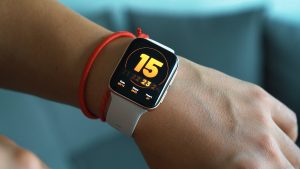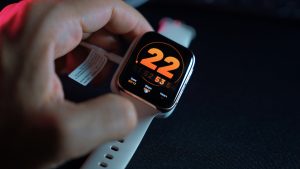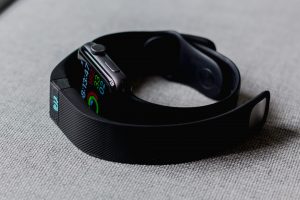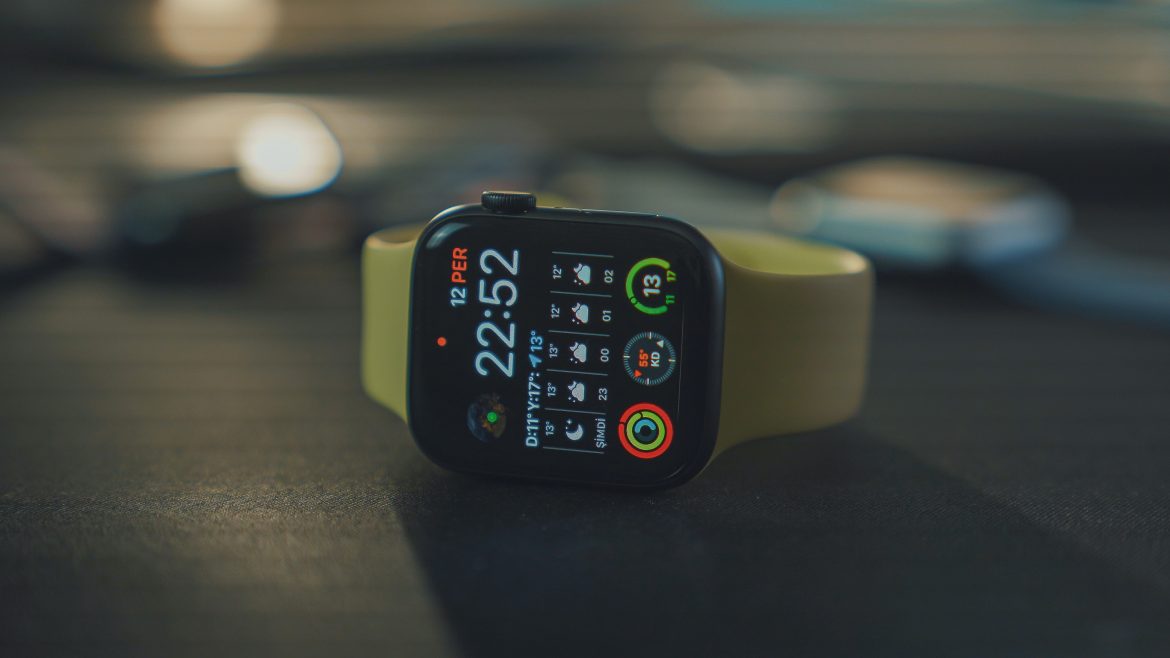Do you often go outside? Is Just sit relax and doing nothing your preference or do you like to work out? If so, the Fit Band could be ideal for your exercise requirements. But, before you buy one, read this article to be sure which Fit Band is good for you. The Fit Band can help you improve your overall health and fitness, therefore it’s critical to pick the ideal one for you.
What is a Fit Band?
A Fit Band is a wristband that has sensors for monitoring your health.

Built-in sensors make Fit bands your personal health assistant. They monitor every aspect of your health like heart rate, steps performed, and calories burned. Some bands use GPS and GSM Technology to track both distances traveled and altitude. This technical data can be used to monitor your fitness progress over time.
Reports on these important health metrics will guide people in making better choices for their lives.
How does a fit band work?

- Sensors: There are many sensors the fit bands come with. You may track your progress and decide on your fitness objectives with the help of these sensors, which collectively give a thorough overview of your health and increase physical activity. You may easily reach your exercise goals with the aid of these modern sensors while maintaining motivation and staying on track.
- Data collection: The wearer’s motions and vital signs are continuously monitored by the sensors, and this data is processed and analyzed by the device’s software. According to the study, the combination of both Fit Band and mobile applications promotes healthy behaviors and activities.
- Data display: The processed data is displayed on the Fit Band’s screen or synced to a mobile app, allowing the wearer to track their fitness progress and make informed decisions about their health and fitness goals.
- Connectivity: Fit Bands can connect to smartphones, tablets, and computers via Bluetooth or Wi-Fi, enabling users to access and share their fitness data across multiple devices.
- Battery life: Battery life is a crucial factor to consider when purchasing a Fit Band. Most bands have long-lasting rechargeable batteries. You don’t need to constantly worry about charging the device. You can just concentrate on your fitness goals. Whether you’re an avid athlete or just a casual gym goer, a Fit Band with a long-lasting battery is a must-have device.
- Additional Features: Certain Bands may provide additional features, including water resistance, GPS tracking, music playback, and mobile payment capabilities. By enabling users to log their workouts in any setting, listen to their preferred music, and make payments on the move, these features can improve the device’s overall functionality and convenience. These additional functions may impact your everyday routine, regardless of whether you’re a fitness enthusiast or just looking for a versatile wearable device.
What are the Types of Fit Bands?
There are different types of Fit Bands based on their design & Features.
Types of Fit Bands Based on Design
- Screen-Based Fit Bands: These Bands feature a display screen that shows fitness data, time, and other important information. These are popular among people who prefer to track their progress immediately.
- Playful Fit Bands: These Bands come in vibrant colors and have fun designs to appeal to kids and teens. These Bands often include games and challenges that encourage physical activity and healthy habits.
- Minimalistic Fit Bands: These Bands are designed to blend in with regular jewelry and can easily be worn daily. These Bands often have a slim profile and come in neutral colors.
Types of Fit Bands Based on Features

- Basic Fit Bands: These Bands typically track steps taken, distance traveled, and calories burned. For novices, these Bands are an excellent alternative because they are affordable and easy to use.
- Advanced Fit Bands: These Bands come with additional features such as heart rate monitoring, sleep tracking, and GPS tracking. These Bands are ideal for people who want a more comprehensive view of their wellness and fitness goals. Advanced Fitness Bands can be expensive, but they offer more features and greater accuracy.
The advantages of Fit bands
There are several advantages to buying a Fit Band for monitoring your exercise habits.
Easily Track Your Workout Activities
One of the best things about investing in a Fit band is that it makes tracking your workout activities super simple.
With these Bands, you can realize your fitness goals. Set a goal, track your progress, and feel the momentum as you train towards your fitness goals.

In addition, you can easily see progress toward fitness goals by looking at your tracker’s “activity level” graph.
Conveniently Track Progress Toward Fitness Goals
Fit bands are excellent motivators when it comes to fitness. They’re like always having your very own personal fitness coach with you!
You can decide when and how to start exercising again more effectively by assessing your progress toward your fitness goal.
And since a fitness band typically connects to a phone app, you can access real-time information about your workouts as well as calories burned and other health stats.
Fit band Can Help You Train Effectively
If you’re looking for an effective way to train harder and faster, a Fit Band is perfect for you.
Not only does a fitness band help track all the data needed for effective training (including steps taken, heart rate readings, and more), but they also often come with built-in software that helps optimize your workouts according to what type of exercise(s) you’re doing.
In addition, most tracker models include sensors that help measure sleep quality so that you know whether bedtime is appropriate for the day’s activity!
Improve sleep quality
Another great benefit of using a Fit Band is that they improve sleep quality overall.
Fitness Bands are a great device for measuring our daily fatigue levels. These devices measure our sleeping durations and analyze EEG activity levels. With help of this, they provide us with detailed information about our sleeping patterns.
By keeping track of our hours spent sleeping and measuring our EEG activity levels throughout the night, these Fitness Bands can help us better understand why we feel tired during the day and whether we need more restful sleep later in the evening.
Effective in helping people to lose weight
A Fit Band is effective for helping people to lose weight.
With a variety of sensors and tracking technology, a Fit Band provides a detailed report on the user’s exercise and diet habits.
This information can be used to recommend changes to the user’s diet or exercise routine, which can help the user lose weight.
Helps you keep motivated & stay committed
Fit Bands can help you keep motivated and stay committed to your fitness goals.
You can continue to improve your fitness by making changes by tracking your progress frequently.
You can also be motivated to go out harder the following day or make sure that you stay on track for long-term goals by monitoring your progress within set timeframes.
Easily Accessible
Since most people can afford Fit Bands, which are a great alternative for anyone searching for a simple and inexpensive way to stay in shape.
There are many Fit bands available from different companies. Therefore, the fitness band that fits your requirements must be bought.
Fit bands can be used for both personal and professional use, and it has become an essential part of many people’s lives.
Fit bands are incredibly popular right now as they have been proven to track your fitness levels, and each comes with its advantages and disadvantages.
The disadvantages of Fit bands
There are several potential problems with fit bands which can influence your decision of buying them.
Cost
In comparison to more advanced smartwatches, Fit Bands tend to be less expensive. Although, that initial investment is still a factor.
Smartwatches and Fit Bands are not the same. When it comes to fitness tracking, both devices are beneficial but serve different purposes. The former is often more attractive and feature-rich.
It is advisable to consider your fitness goals for using a Fit Band before making a costly Fitness Band Purchase
If training with friends is more appealing than using a fitness tracker, then downloading a social exercise app is the way to go.
You probably don’t need a smartwatch as well if you don’t think the price of a Fitness Band is justified by your needs as they are sometimes much more expensive.
Fit Bands Can Provide Inaccurate Results
Many people are often misled by Fitness Bands in the belief that they will help them lose weight or get fitter.
In reality, many Fit Bands can provide inaccurate results as they rely on many inaccurate assumptions about human body composition and exercise habits.
For instance, a lot of Fit Bands falsely assume that everyone is the same size and shape, which might result in exaggerated expectations about what regular exercise can do.
Additionally, many Fitness Bands often rely on pre-determined workout routines and goals instead of letting users customize their routines.
Despite such wide popularity, Fitness Bands have very little scientific evidence to prove their efficiency.
Fit Bands could make people obsessed with numbers.
If you become fixated on tracking your progress and numerical goals, this could lead to an obsession with numbers and over-reaching fitness goals.
This could cause body fat percentages to decrease prematurely or even stop entirely – something that would be very undesirable for both your personal health and career development!
Cybersecurity & Privacy Concerns
Many brands of Fit Bands can gather information about your exercise habits and the kinds of activities you engage in.
Businesses like universities and healthcare organizations can utilize this data for marketing as well as research purposes.
These devices raise certain privacy issues because it is possible to track activity levels and movements without the owner’s permission or agreement.
You can also be the target of advertisements and other marketing materials using the information that these Fitness Bands gather.
Unreliable for Medical Diagnosis
It’s important to bear in mind that while some of the Fitness Bands may alert you to potential health issues by monitoring your heart rate, oxygen levels, and temperature but they are not certified medical equipment and cannot be relied upon to provide correct clinical diagnoses.
Several professionals advise people to limit its use to the most fundamental purposes, such as keeping track of their daily step count, caloric consumption, and heart rate.
People suffering from a condition like diabetes or hypertension should not use Fitness Bands.
How to Use a Fit Band

- Choose the right Fit Band for your needs: Select the Perfect Fit Band to Meet Your Needs: With a plethora of Fitness Bands on the market, it is crucial to select one that aligns with your unique lifestyle and fitness objectives.
- Set up your Fit Band: To begin using your Fit Band, it is essential to set it up by pairing it with your smartphone and downloading the companion app. Making the most of your device’s features is ensured by this quick and simple approach. By following the instructions provided in the user manual, you can effortlessly connect your Fitness Band to your smartphone and start tracking your fitness goals. You’ll be well on your road to better health after just a few minutes spent configuring your Fitness Band.
- Wear your Fit Band correctly: To ensure accurate tracking of your fitness data, it is crucial to wear your Fitness Band correctly. The band should fit snugly on your wrist, without being too tight. This will not only provide you with precise information but also prevent any discomfort or irritation. It is crucial to adjust the band so that it comfortably fits your wrist. By doing so, you can make the most out of your Fitness Band and achieve your fitness goals effectively.
- Track your fitness data: Fit Bands support you in your quest for a healthy lifestyle. A lot of data is gathered by fitness bands, such as the number of steps taken, calories burned, number of hours slept, heart rate, and others. To ensure that you can keep track of your progress, it is important to sync your Fitness Band with the corresponding app. This infographic will help you become a better, fitter person by helping you make manageable fitness goals and track your progress.
- Setting Fitness Goals: Utilize the data provided by your Fitness Band to establish realistic fitness objectives and monitor your advancement towards achieving them. This approach will enable you to stay motivated and focused on your fitness journey.
How Fit Bands Measure Steps
Types of Sensors Used in Fit Bands
Fit Bands use various sensors to track steps, including accelerometers and gyroscopes. Accelerometers measure acceleration, which is used to detect movement, while gyroscopes measure rotation and orientation.
Step Counting Algorithms
Fitness Bands use step-counting algorithms to determine how many steps the wearer has taken. The algorithms consider factors such as the Individual’s height, weight, and length of step to calculate how many steps are taken.
Factors That Affect Step Count Accuracy
The accuracy of step count can be affected by various factors, such as the placement of the device on the wearer, wearing loose clothing, or inconsistent walking patterns.
How Fit Bands Track Health
Types of Health Metrics Tracked
The Fitness Band can track your heart rate and body temperature and finds data-driven insights to help lower blood pressure, improve workouts, and prevent sleep apnea. Some models also have advanced features such as stress tracking and menstrual cycle tracking.
Sensors Used to Track Health Metrics
Fitness Bands use various sensors to track health metrics, depending on the type of metric being tracked. Take Fitbit, which is known for its ability to track fitness, as an example.
It produces an accurate report on steps walked, calories burnt, and even sleep patterns thanks to its integrated accelerometer and optical heart rate sensor technology.
Accuracy of Health Metric Tracking
The accuracy of health metric tracking can vary depending on the quality of the sensors and algorithms used. In general, most Fitness Bands are accurate enough for general health tracking purposes but may not be suitable for medical purposes.
Factors That Can Affect the Accuracy of Fit Bands
The use of Fitness bands to keep an eye on health has been increasing day by day. But can you rely on the accuracy of the Fitness band? Below are some factors that can impact the accuracy of the Fit band.
Environmental Factors
One of the most significant factors that can affect the accuracy of Fitness Bands is the environment. Devices can count steps that differ depending on the surface you’re walking on and other factors like humidity, temperature, and barometric pressure.
Wrist Placement
Wrist placement is another factor that can affect the accuracy of Fitness Bands. If the band is not worn correctly, it can cause inaccurate readings. Wearing the device around your wrist tightly but comfortably is vital. In addition, you should wear the device in such a way that your skin must touch with the device’s sensors.
Calibration
Calibration ensures the device always maintains accuracy and protects the device from changes in temperature. It’s crucial to calibrate your Fitness Band regularly. Calibration requires entering your height, weight, and other parameters to confirm that the device is producing accurate data.
How to Choose the Right Fit Band for Your Needs

To meet your needs, fit bands are available in a range of sizes and designs. Shopping for the right Fit Band can be difficult as there are so many choices.
Factors to Consider When Choosing a Fit Band
When choosing a Fit Band, consider your goals and fitness level. If you’re just starting and want to track your steps and calories, a simple Fitness Band might be best for you.
However, you might want to think about a more advanced Fitness Band if you’re an athlete or want to track other metrics like heart rate, sleep, and workout routines.
Battery life, water resistance, and compatibility with other health applications are further considerations to consider.
Comparing Features and Price Points of Popular Fit Bands
To choose the right Fit Band for your needs, it’s essential to compare features and price points.
Some popular Fitness Bands include the Fitbit Charge 4, Garmin Vivosport, and Samsung Galaxy Fit.
These Fitness Bands offer a range of features, including heart rate monitoring, sleep tracking, and calorie and exercise tracking.
Keeping in view the Prices of the Fit band, You should opt for a Fit band that matches your budget and desired Features.
Fit Bands vs Smartwatches: Which is the right fit for you?
The question is whether you should go for Fit bands or Smartwatches. What you want out of your wearable device eventually decides what to choose.
Fitness Bands are great for individuals who are focused on tracking their physical activity and monitoring their overall health.
The Fitness bands are usually lightweight and less costly than smartwatches without compromising on healthy features.
The smartwatch is the optimal choice for individuals seeking a device that combines fitness tracking and smart capabilities. It’s your solution to a fit and healthy lifestyle.
The decision between choosing a Fit Band and a smartwatch depends on your personal requirements and preferences.
Who can use a Fit Band?
Fit bands are perfect for individuals looking to enhance their lifestyles, For example.
- Fitness Enthusiasts: Fitness Bands are ideal for people who are already active and want to track their progress and set goals for themselves.
- Sedentary Individuals: For people who are not active, Fitness Bands can be a great tool to help them start moving. By tracking their daily steps, these devices can motivate users to increase their activity levels and improve their overall health.
- People with Health Conditions: People with Health Conditions: For those suffering from diseases including diabetes, obesity, and heart disease, Fit Bands can be helpful. These devices monitor a person’s activities which can aid in injury avoidance and condition control.
- Professionals: Fitness Bands can also be helpful for professionals who have a sedentary lifestyle, such as office workers. Modern lifestyle often leads to poor posture and health issues. these devices can help monitor how it is affecting us and how we can improve our work posture.
- Athletes: With the use of fitness bands, Athletes can better track their fitness growth with time. They can easily and effectively improve their performance and reach their fitness objectives with this invaluable information.
The Final Verdict
In recent years, the demand for Fit Band has gained Increased. Now, Fitness Band is being considered an affordable solution for achieving fitness goals. They encourage physical activity, measure habits, and goals, and act as a daily reminder to be mindful of your health.
It is difficult to find the ideal fitness band when number of models from different companies in the market.
There are different factors one should consider before buying a fitness band. Comfortability, style, and affordably are some of them.
Anyone interested in tracking their fitness goals and progress can use a Fit Band. From seasoned athletes to casual gym-goers, this wearable technology offers convenient ways to stay healthy.
Reaching your exercise and health goals may be significantly impacted by choosing the correct Fit Band. So, finding a Fitness Band that fits your lifestyle and caters to your requirements is essential.
So, don’t wait any longer, invest in a Fit Band today and take the first step towards a healthier and happier you!



